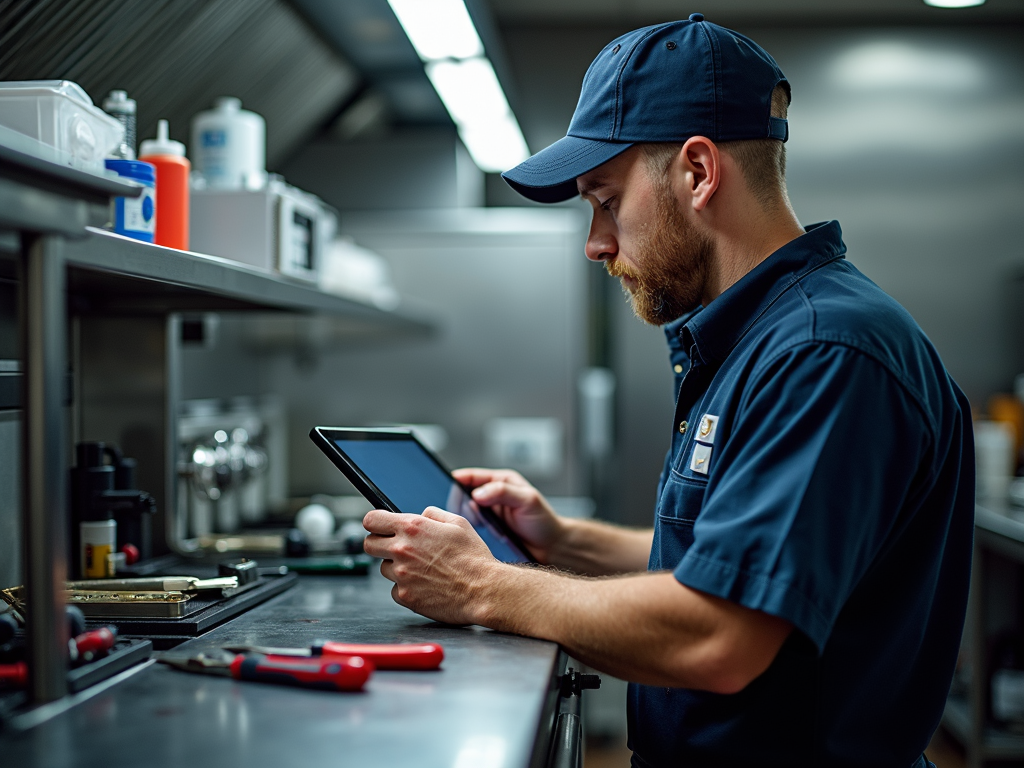Elevate Efficiency: Mastering First-Time Call Resolution in Food Equipment Support
In the bustling world of food service, equipment managers and maintenance professionals face a relentless challenge: ensuring that every piece of equipment runs smoothly and efficiently. At the heart of this challenge lies the concept of First-Time Call Resolution (FCR). Achieving FCR is not merely a goal; it's a lifeline that promises to maintain operational continuity, enhance customer satisfaction, and minimize unnecessary costs. This blog post delves into the intricacies of FCR, emphasizing its pivotal role in reducing replacement part shipments and optimizing service efficiency in food equipment support.

The Importance of First-Time Call Resolution
First-Time Call Resolution refers to the ability to resolve a customer's issue during the very first interaction. In food equipment support, this translates to technicians diagnosing and fixing problems without the need for follow-up visits or shipments of replacement parts. Why is this so crucial? Let’s paint a picture.
Imagine a bustling restaurant during peak hours, where every second counts. A malfunctioning oven could lead to delays in service, unhappy customers, and potential losses. Here, FCR becomes a game-changer, significantly reducing equipment downtime and ensuring that operations flow seamlessly. The financial implications are equally staggering; multiple service calls and unnecessary part shipments can eat into budgets faster than a chef can flip a pancake. By prioritizing FCR, food equipment managers can save both time and money, leading to a more efficient operation.
Key Strategies to Improve First-Time Call Resolution
Improving FCR is not merely about having skilled technicians; it requires a holistic approach that encompasses training, tools, and processes. Here are five key strategies that can help elevate FCR in your operations:
1. Technician Preparation and Experience
The backbone of any service operation lies in its technicians. Having well-trained and seasoned professionals can make all the difference. A technician's experience enhances their ability to diagnose issues quickly and accurately, thereby increasing FCR.
- Ongoing Education: Technicians should have access to continuous training and development opportunities, ensuring they stay updated on the latest equipment technologies and troubleshooting techniques.
- Manufacturer Resources: Providing technicians with access to manufacturer resources can enhance their problem-solving capabilities, allowing them to tackle even the most complex issues.
2. Implementing Clear Definitions and Processes
Every effective strategy begins with clarity. Establishing clear definitions of what constitutes a "first call" and the communication channels involved is essential. This not only helps technicians understand their goals but also facilitates better measurement of FCR success.
- Define Communication Channels: Whether it's phone, text, or chatbot, clarity in communication enhances the likelihood of achieving FCR.
- Guidelines for Measurement: Create metrics to track success. Regular assessment of these metrics can reveal areas for improvement.
3. Equipping Technicians with the Right Tools
In the digital age, having the right tools can significantly enhance service efficiency. Equip your technicians with advanced technology that supports their efforts to resolve issues quickly.
- CRM Systems: Implementing a customer relationship management system can provide technicians with vital historical data and insights into previous calls, enabling them to make informed decisions.
- Daily Stand-Up Meetings: Regular team discussions can help identify unresolved issues and prepare technicians for the day ahead.
4. Total Contact Ownership
What if the person who answered the call was responsible for seeing the issue through to resolution? This approach, known as Total Contact Ownership, fosters accountability and professionalism.
- Encouraging Accountability: By empowering technicians to own their calls, you enhance the quality of service and customer satisfaction, making them less likely to transfer calls or escalate issues unnecessarily.
5. Preventive Maintenance and Real-Time Support
Prevention is always better than cure. By adopting preventive maintenance strategies and leveraging real-time support tools, you can diagnose issues accurately and resolve them during the first call.
- Routine Checks: Regular preventive maintenance can help identify potential issues before they escalate into larger problems.
- Real-Time Visual Support: Solutions like Blitzz offer real-time visual support, enabling technicians to provide accurate diagnoses remotely, enhancing FCR rates.
Overcoming Common Challenges
While striving for FCR, it’s crucial to recognize and address common challenges that may arise:
- High Costs: Multiple service calls and part shipments can quickly escalate costs. Implementing FCR strategies can mitigate these expenses significantly.
- Minimizing Equipment Downtime: Developing rapid response strategies ensures that issues are resolved promptly, reducing downtime.
- Preventing Misdiagnosis: Thorough technician training and access to reliable information are essential to prevent misdiagnoses that can lead to unnecessary part shipments.
Blitzz Solution: A Game Changer for FCR
In the quest for improved FCR, the Blitzz Solution stands out as a transformative technology. This innovative platform provides real-time visual support that enhances diagnosis and troubleshooting, allowing technicians to resolve issues more effectively during the first call.
- Enhanced Diagnostic Capability: With visual support, technicians can see the problem as it unfolds, allowing for more accurate diagnoses.
- Success Stories: Numerous clients have reported improved FCR rates and reduced operational costs after integrating Blitzz into their processes.
- Getting Started: Implementing Blitzz is straightforward. Organizations can begin by assessing their current processes and identifying areas where real-time support could be beneficial.
Conclusion
In the high-stakes world of food equipment support, mastering First-Time Call Resolution is not merely advantageous; it’s essential. By implementing the strategies discussed here, food equipment managers and maintenance professionals can significantly reduce equipment downtime, lower costs associated with multiple service calls and part shipments, and ultimately elevate service efficiency.
Are you ready to transform your operations and achieve the efficiency you deserve? Embrace the power of FCR today! For a closer look at how Blitzz can elevate your service capabilities, schedule a demo now.
What is First-Time Call Resolution (FCR) in the context of food equipment support?
FCR in food equipment support refers to the ability to resolve customer issues during the first contact, without the need for follow-up visits or multiple service calls. This is crucial for maintaining operational efficiency and reducing downtime for food service operations.
How does minimizing replacement part shipments impact cost efficiency?
Minimizing unnecessary replacement part shipments can significantly lower operational costs. Each shipment incurs expenses such as shipping fees, handling, and potential downtime. By achieving FCR, businesses can reduce these costs and improve overall efficiency.
What are some best practices for training technicians to enhance FCR?
Best practices for technician training include providing ongoing education, access to manufacturer resources, and hands-on training. Experienced technicians are better equipped to solve problems quickly and effectively, leading to higher FCR rates.
How can technology tools, like CRM systems, improve First-Time Call Resolution?
CRM systems provide technicians with access to historical data and customer information, which can facilitate quicker and more informed problem-solving. Additionally, implementing tools for real-time communication enhances team collaboration, ultimately improving FCR.
What role does preventive maintenance play in achieving First-Time Call Resolution?
Preventive maintenance helps identify and address potential issues before they escalate, thereby minimizing equipment downtime. Regular maintenance checks ensure that equipment operates efficiently, making it easier for technicians to resolve problems on the first call.
.png?width=120&height=55&name=Blitzz-Logo-right%20white%20eyes%20-%20not%20transparent%20(3).png)


